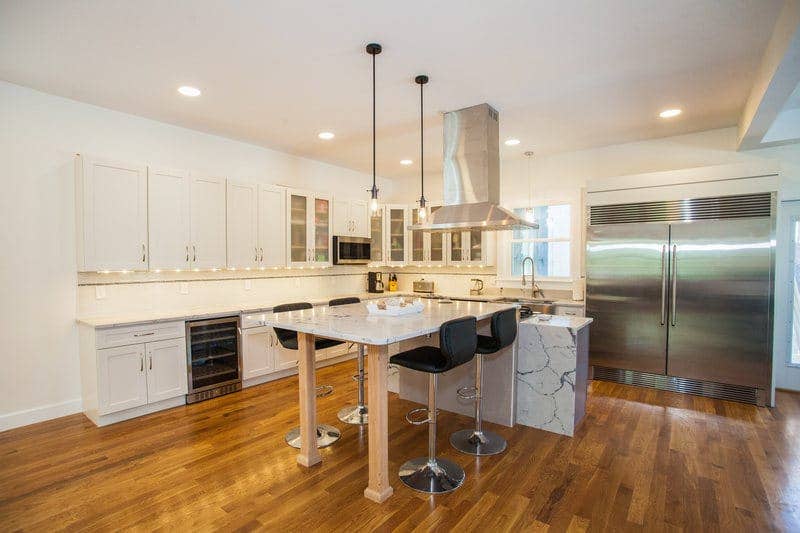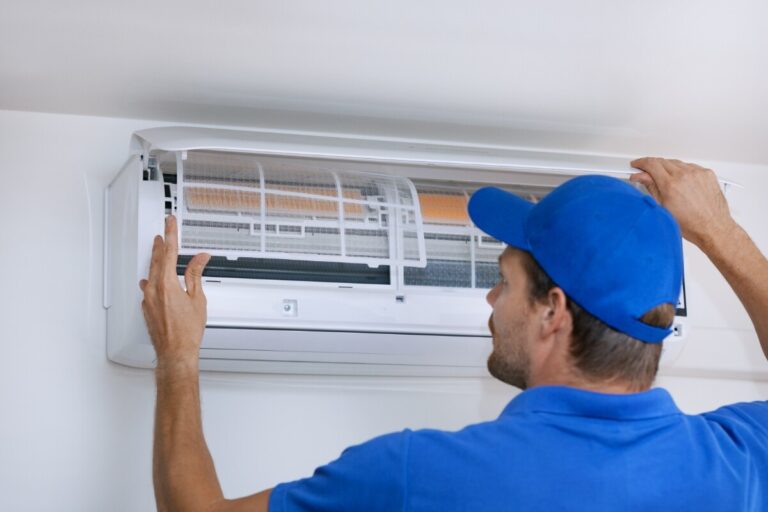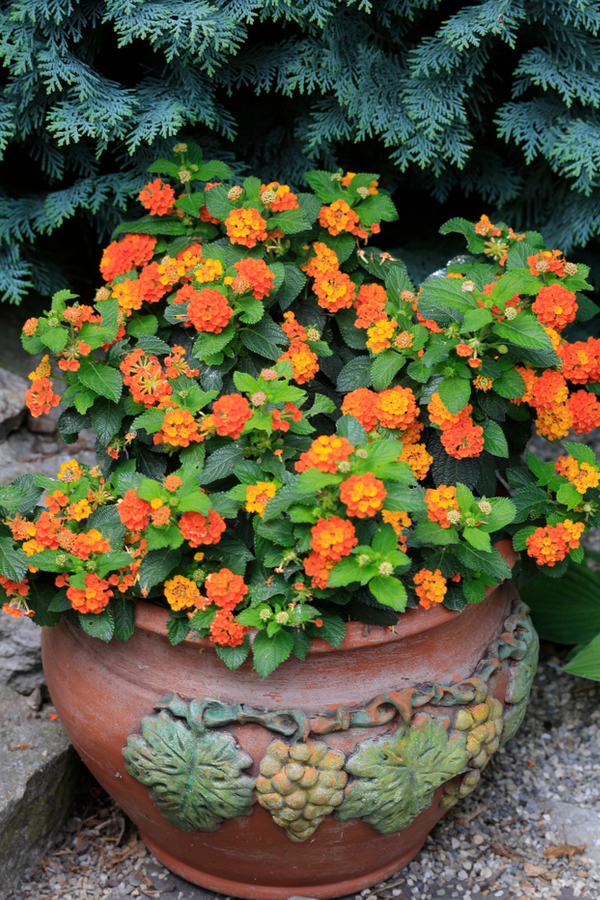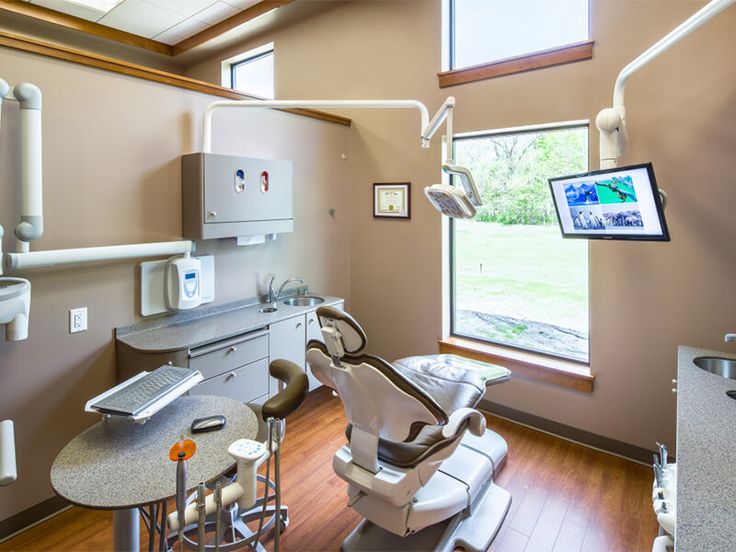Do Range Hoods Have To Be Vented Outside?
Range hoods are essential kitchen appliances that help to improve the air quality of our homes. They are designed to filter out grease, smoke, and other airborne contaminants, preventing them from entering our living spaces. The primary question when evaluating range hoods is whether or not they need to be vented outside. The answer depends on the type of range hood you are using. Non-vented range hoods are designed with filters that can be easily replaced as they become saturated with grease and smoke, while vented range hoods require an external vent that will exhaust the air directly outside of the home. Vented range hoods are more effective at removing smoke and odors from the kitchen, and they can also help to reduce moisture levels and improve indoor air quality.
Overview of Range Hoods
Range hoods have become an essential tool in the kitchen for ventilation, air circulation, and smoke removal. But do range hoods have to be vented outside? The answer is yes, and no. While some range hoods do not require an external vent, others absolutely do. In this article, we’ll explore the types of range hoods available, their differences, and how to tell which range hoods need an external vent and which don’t.
Range hoods come in two main varieties – ducted and ductless. Ducted range hoods are connected to a ventilation system which removes air, smoke, and odors from the kitchen and vents them outside. Ductless range hoods, on the other hand, filter the air and recirculate it back into the kitchen. Both types of range hoods have their own benefits and drawbacks, which should be considered when making a purchasing decision.
Ducted range hoods are the most effective at removing smoke, odors, and other airborne contaminants from the kitchen. They are also the most energy-efficient, as they use less electricity to power the motor and fan. However, they can be more expensive to install and require regular maintenance to ensure they are working properly.
Ductless range hoods are less expensive to install and require less maintenance. They are also easier to install, as they do not require an external vent. However, they are not as effective at removing smoke and odors as ducted range hoods. Additionally, they can be noisy, as they recirculate the air in the kitchen.
Ultimately, the decision of whether or not to install a ducted or ductless range hood depends on the size and configuration of the kitchen, the budget, and the desired level of air circulation. However, it is important to remember that whichever type of range hood you choose, it is essential to ensure it is properly installed and maintained to ensure optimal performance.
Types of Range Hoods
Range hoods are an important part of any kitchen, especially if you cook frequently. They come in two main types – vented and non-vented. Vented range hoods are designed to vent air outside of the home, while non-vented range hoods use filters to capture smoke and odors before they enter the home. Both types are effective in reducing smoke and odors, but depending on your home and lifestyle, one type may be better suited for your needs than the other.
Vented range hoods are typically the most powerful type, as they are connected to an external vent that exhausts air to the outside. This type of range hood is perfect for homes with a central venting system, as it can be easily connected and requires minimal installation. Vented range hoods are also the best choice for frequent cooks, or those who like to use their oven and stovetop at the same time.
Non-vented range hoods are much quieter than vented hoods, and they don’t require an external vent. Instead, they use powerful filters to capture smoke and odors before they enter the home. They are often the most economical choice when it comes to installation costs, as they don’t require any ventilation work. They are also ideal for homes without a central venting system, as they don’t need to be connected to an external vent.
No matter which type you choose, range hoods are an essential part of any kitchen. They help keep your home free from smoke and odors, and can help make cooking a more enjoyable experience. Before making a decision, consider your home, lifestyle, and budget to determine which type of range hood is best for you.
Benefits of Range Hoods
Range hoods are an important feature of your kitchen and can offer many benefits to the homeowner. Range hoods are designed to capture smoke, grease, steam, and other airborne particles as they are created during cooking. By doing so, range hoods help to improve the air quality in your home and reduce the risk of respiratory illnesses. Range hoods also help to reduce odors and prevent smoke from spreading throughout the home. In addition, range hoods can be used to remove heat from the kitchen, ensuring a more comfortable cooking experience. However, some range hoods require venting outside, while others do not. Before purchasing a range hood, it is important to understand the benefits of the different types and their requirements.
Range hoods that are vented outside are typically more effective than those that are not. By venting outside, range hoods are able to efficiently remove airborne particles and odors from the home, helping to improve air quality. Additionally, the vented range hoods are able to capture more grease, smoke, and steam, providing a more effective cleaning experience. Vented range hoods also typically offer higher airflow, making them more effective at removing heat from the home.
On the other hand, range hoods that are not vented outside do not offer the same effectiveness as those that are vented outside. Without the vent, the range hood is unable to effectively capture all the airborne particles and odors, which can lead to a buildup of smoke and grease in your home. Additionally, these range hoods typically offer lower airflow and are less effective at removing heat from the kitchen.
Overall, range hoods can offer a variety of benefits to the homeowner, from improved air quality to reduced odors and more comfortable cooking temperatures. Thus, it is important to understand the different types of range hoods and their requirements before making a purchase. Range hoods that are vented outside are typically more effective than those that are not, helping to improve the air quality in your home and reduce the risk of respiratory illnesses.
Why Range Hoods Need to Be Vented Outside
Range hoods are a crucial aspect of any kitchen setup, as they help to remove smoke, odors, and grease from the air. However, many range hoods are installed incorrectly, which can lead to inefficient performance and even air quality issues. To ensure that your range hood is working effectively, it needs to be vented outside.
Venting your range hood outside helps to increase air circulation in your kitchen. This is because it allows the hot air, smoke, and odors to be drawn away from the cooking area, instead of simply circulating them throughout the space. It also helps to prevent the buildup of grease and other contaminants, which can be a health hazard if left unchecked.
In addition to improving air quality, venting your range hood outside can also help to reduce noise. Without proper ventilation, range hoods can be quite noisy, which can be disruptive in an otherwise peaceful kitchen. By venting the hood outside, you can reduce the noise and make your kitchen a more comfortable and peaceful place to cook.
Finally, by venting your range hood outside, you can also help to preserve the life of your range hood. Without proper ventilation, range hoods can become clogged with grease and other debris, which can cause them to become worn down over time. By venting it outside, you can help to prolong the life of your range hood and keep it operating effectively for many years to come.
In conclusion, range hoods need to be vented outside for a variety of reasons. Not only does this help to reduce noise and improve air quality in your kitchen, but it also helps to preserve the life of your range hood so that it can continue to operate effectively for many years to come.

Range Hood Venting Options
Range hoods are a must-have in any kitchen. They help keep your cooking area clean, free from smoke and odors, and can even improve air quality. But when it comes to installation, one of the most important considerations is how the range hood will be vented outside. There are a few options available, each with their own pros and cons.
The most common method of venting a range hood is through an exterior wall. This is usually the easiest option, as it requires the least amount of installation work. However, it may not be suitable for all homes, as some may not have an exterior wall that can be used.
Another popular option is venting the range hood through the roof. This is a great choice for those who have an existing roof vent, as it eliminates the need to install a new one. However, it can be difficult to access the roof, and the ductwork can be expensive.
Finally, range hoods can also be vented directly into the home. This option is often the most affordable, as it doesn’t require any additional installation. However, it can lead to moisture and air pollution in the home, making it a less than ideal choice.
When it comes to range hood venting, there are a few options available. It’s important to consider the pros and cons of each before making a decision. Doing so will ensure that you choose the best option for your home and install a range hood that will safely and effectively vent away smoke and odors.
Installation and Maintenance Considerations
Range hoods are a great way to get rid of smoke, odors, and grease while cooking. However, many homeowners are uncertain about the best way to install and maintain them. The most common question is: do range hoods have to be vented outside? The answer is yes, in most cases.
Range hoods should be vented outside because they are designed to remove airborne particles and exhaust air from the kitchen. Without an outside vent, the particles and air will simply recirculate around the kitchen, resulting in poor air quality and potential health risks. Moreover, a range hood that isn’t properly vented will be less effective in reducing smoke, odors, and grease.
When installing a range hood, it’s important to choose a model that is approved for venting outside. Make sure to read the manufacturer’s instructions carefully and follow all safety guidelines. Be sure to have the hood and vent professionally installed by a qualified technician.
Maintenance is also an important factor. Regularly cleaning the filters and vents helps keep the range hood in good working condition. Replace filters as needed, and inspect the vent annually for signs of wear or damage.
Overall, range hoods should be vented outside, and it’s essential to follow the manufacturer’s guidelines for installation and maintenance. With the right care, range hoods can be an effective way to keep your kitchen air clean and healthy.
What To Consider When Choosing a Range Hood
Choosing the right range hood is essential to the overall function and look of your kitchen. A range hood is a ventilation appliance that helps to remove smoke, heat, and odors from your cooking area. It is important to consider the size, shape, and type of range hood you need, as well as the installation requirements, in order to get the most out of your purchase.
Size and shape are the two most important factors when selecting a range hood. The size of the hood should be proportional to the size of the range, and the shape should be compatible with the overall look of the kitchen. The type of range hood you choose will also depend on the type of range you have. Some range hoods are designed for wall-mounted ovens, while others are designed for freestanding ranges.
When it comes to venting, there are several options to consider. Some range hoods are designed to be vented directly outside, while others can be vented through the roof or into the attic. If you are installing a range hood in an existing kitchen, you may want to consider an optional ductless model that does not require venting.
Ultimately, the type of range hood you choose will depend on your needs and budget. Whether you choose a ducted or ductless model, it is important to consider the size, shape, and type of range hood that best suits your kitchen. With the right range hood, you will be able to enjoy the benefits of a well-ventilated kitchen while cooking your favorite meals.
Conclusion
When it comes to range hoods, the answer to the question is yes, they do need to be vented outside. Without a vent, the heat, smoke, and other pollutants will meander around your kitchen, causing health risks, and the steam and odors will cling to walls and furniture, causing a less than pleasant smell in the home. By venting your range hood outside, not only will it help to keep your kitchen smelling fresh, but it will also help to reduce the risk of carbon monoxide poisoning. Installing a range hood is an important part of making sure your kitchen is safe and healthy. If you’re not sure how to properly vent your range hood, consult a professional.
FAQs About the Do Range Hoods Have To Be Vented Outside?
1. What are the benefits of having a range hood vented outside?
A range hood vented outside helps to remove odors, smoke, and steam from the kitchen, as well as grease and other particles from the air. This helps to keep your kitchen clear of pollutants and unwanted odors.
2. Are there any alternatives to venting a range hood outside?
Yes, some range hoods are designed with recirculating filters that allow you to filter the air and recirculate it back into the kitchen. This is a good option if you don’t want to install a venting system to the outside.
3. Does the size of the range hood determine if it needs to be vented outside?
No, the size of the range hood does not determine if it needs to be vented outside. Some range hoods may be able to recirculate the air, while others may be too powerful and require venting outside.
Conclusion
Overall, the answer to the question of whether range hoods must be vented outside is yes. Range hoods must be vented outside to ensure proper air circulation, to prevent kitchen odors from entering other parts of the home, and to reduce the risk of fire or smoke inhalation. While there are other options that may be available, such as recirculating range hoods, these are not recommended as they are not as effective at removing smoke, grease, and odors.






